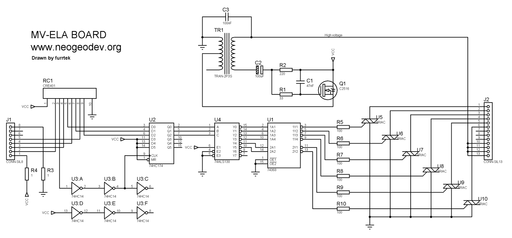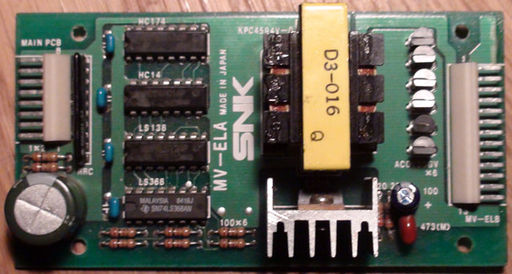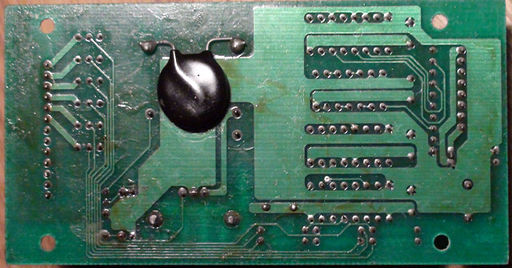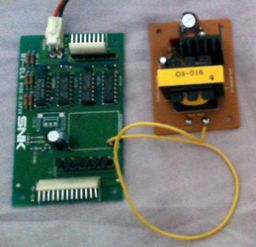MV-ELA: Difference between revisions
m (Created page with "External board used in MVS systems. Generates high voltage and switches it to light up the EL panels on the MV-ELB boards. Uses 6 AC0V8 triacs ([[http://www.alldatasheet.co...") |
m (Revisions) |
||
| (7 intermediate revisions by the same user not shown) | |||
| Line 1: | Line 1: | ||
[[File:Mv-ela_schem.png|thumb|512px|MV-ELA schematic]] | |||
External board provided with original multi-slot [[MVS hardware|MVS]] cabs to generate high voltage and switch it to the [[marquee]]'s [[MV-ELC]] or [[MV-ELD]] board(s). | |||
Often produces a high-pitched noise when some panels are lit, this is normal and common with old switching PSUs. If the noise is too annoying, replace the transformer. LED replacement kits can also be found. | |||
[[Category: | Software control is done through registers {{Reg|REG_LEDDATA}}, and {{Reg|REG_LEDLATCHES}}. See [[Controlling the marquee]]. | ||
'''Be careful when manipulating this board when powered: touching the high voltage section can hurt A LOT.''' After disconnecting power, it shouldn't keep a dangerous charge for long. | |||
{| | |||
|[[File:Mv-ela_top.jpg|thumb|512px|MV-ELA top]] | |||
|[[File:Mv-ela_bot.jpg|thumb|512px|MV-ELA bottom, HV cap]] | |||
|} | |||
=Revisions= | |||
[[File:Mv-ela_bodge.jpg|thumb|256px|"Oops" version of the MV-ELA board.]] | |||
* An early version of the MV-ELA board (same reference) exists, with a separate power input connector and the high-voltage part as another separate bodge board. | |||
* The MV-ELA-1 has the high-voltage C3 cap correctly placed on the components side, and uses a 1 watt resistor as fuse. | |||
=Components= | |||
* Off-the-shelf logic chips, see schematic. | |||
* 5 pin transformer and C2516 transistor to form a self-oscillating voltage step-up circuit. | |||
* 6x 800mA 400V AC0V8 triacs ([http://www.alldatasheet.com/datasheet-pdf/pdf/105128/NEC/AC0V8DGM.html datasheet]) for switching outputs. | |||
=Repair= | |||
The marquee can be tested in the [[system ROM]]'s hardware test menu. The third screen shows an "EL" value which should count from 1 to the number of slots available on the system, turning each panel on in sequence. | |||
If the step-up circuit stalls, the transistor may short 5V to ground. This will cause the two (or unique) resistor(s) near the "MAIN PCB" connector to burn out. | |||
In this case, replace: | |||
* The C2516 transistor | |||
* The power input resistor(s) (R3 and R4) | |||
* Capacitors and resistors in the feedback circuit (C1, C2, R1 and R2) | |||
* The transformer, if any winding is open | |||
If the step-up circuit works but some or all panels don't light up, check the triacs first, then the logic chips. | |||
If some triacs are dead, make sure that the marquee wiring or boards don't have any shorts. | |||
[[Category:Cartridge systems]] | |||
[[Category:Repairs]] | |||
Latest revision as of 04:51, 14 November 2017

External board provided with original multi-slot MVS cabs to generate high voltage and switch it to the marquee's MV-ELC or MV-ELD board(s).
Often produces a high-pitched noise when some panels are lit, this is normal and common with old switching PSUs. If the noise is too annoying, replace the transformer. LED replacement kits can also be found.
Software control is done through registers REG_LEDDATA, and REG_LEDLATCHES. See Controlling the marquee.
Be careful when manipulating this board when powered: touching the high voltage section can hurt A LOT. After disconnecting power, it shouldn't keep a dangerous charge for long.
 |
 |
Revisions

- An early version of the MV-ELA board (same reference) exists, with a separate power input connector and the high-voltage part as another separate bodge board.
- The MV-ELA-1 has the high-voltage C3 cap correctly placed on the components side, and uses a 1 watt resistor as fuse.
Components
- Off-the-shelf logic chips, see schematic.
- 5 pin transformer and C2516 transistor to form a self-oscillating voltage step-up circuit.
- 6x 800mA 400V AC0V8 triacs (datasheet) for switching outputs.
Repair
The marquee can be tested in the system ROM's hardware test menu. The third screen shows an "EL" value which should count from 1 to the number of slots available on the system, turning each panel on in sequence.
If the step-up circuit stalls, the transistor may short 5V to ground. This will cause the two (or unique) resistor(s) near the "MAIN PCB" connector to burn out.
In this case, replace:
- The C2516 transistor
- The power input resistor(s) (R3 and R4)
- Capacitors and resistors in the feedback circuit (C1, C2, R1 and R2)
- The transformer, if any winding is open
If the step-up circuit works but some or all panels don't light up, check the triacs first, then the logic chips.
If some triacs are dead, make sure that the marquee wiring or boards don't have any shorts.